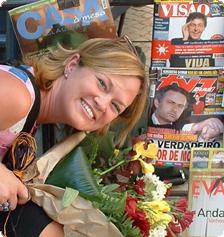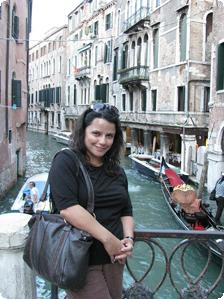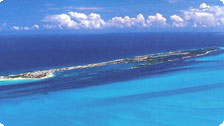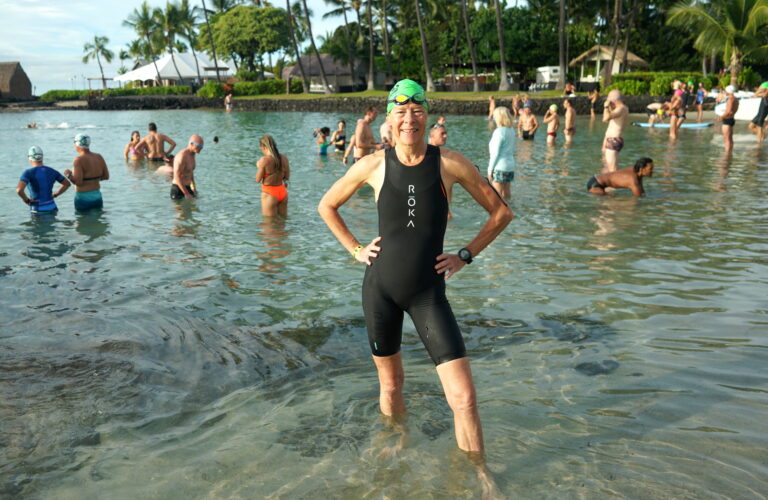Inspiration: Europe: Travel Advice From A Savvy Expat
by Kristin Pedroja
Kristin is obsessed with exploring. Perhaps it was her upbringing in Wichita that got her dreaming of yonder from a tender age, but wanderlust had her in its clutches as soon as she saw the Alps for the first time at age eight.
After receiving her English degree at the University of Kansas, where her international experience was sadly limited to dating cute foreign boys, she moved to Seattle to be a journalist and barmaid. Eight years and six cities later, she is still a journalist, though prefers to call herself a freelance writer, and no longer a barmaid—though she still mixes a mean Bloody Mary. Her stints have included San Francisco, Denver, Prague, Lugano, and Lisbon. She currently hangs her rucksack in Ljubljana, Slovenia, where she teaches writing and writes English exams for Slovenes who will represent Slovenia in the European Union, the United Nations, and NATO. Her love affair with Europe has taken her all over the continent—and she has no intention of it ending anytime soon.
Here are four selections from Kristin’s substantial travel knowledge, philosophies and warnings, and her thoughts on intoxicants:
I. Living is Living Anywhere
Somewhere along the line, someone got the idea that living in Europe involves a daily ritual of letting the hours pass at a streetside café with The Guardian, a worn copy of Dostoyevsky, and a coffee, glancing pointedly beneath furrowed brow whilst contemplating the origin of man.
Right.
A big myth about living abroad is that it’s going to be different than life anywhere else. Believe me, it’s not. You get up, you go to work, and you go home. Then add the frustrations of trying to accomplish everything in another language, with another system of (usually thicker) bureaucracy. Figure that with the cultural divides and social mores of a place, and, of course, the ridiculous need to fit in somewhere, and you’ve got yourself a problem much bigger than which coffee drink to order next.
On the flip side, there isn’t a day when I wake up angry, upset, or pissed off. I savour life here in Ljubljana, the capital city of Slovenia.
One of the best things I’ve learnt is how to invite people into my life whom I wouldn’t otherwise. Comparable only to, perhaps, boarding school or a sorority house, living in another country often bonds you to people you wouldn’t normally meet. It opens up (or narrows, depending on your outlook) your dating world, and somehow the cute, skinny Irish guy who goes on the piss all the time starts to be charming rather than annoying. My best friends from here are women and men I may not have known otherwise, as our social circles wouldn’t have crossed back home. It’s a deeper friendship somehow, a shared experience of heaven and the ridiculous, that will keep these people in my life.
And, of course, there is loneliness. It’s a distant, hollow loneliness, blameless in nature and open in spirit. Self-inflicted. There is a dignity to it, a soft chill that I thrive on in order to make sense of this life I’ve chosen to lead. Acquaintances are fleeting, as this is a transient life, figures and souls moving in and out of everyone else’s orbits. I’m lucky to have held on to a few of those. At the same time, the bond is thicker than the usual random friendships that fizzle; the shared experience is still there, whether you choose to continue it or not. It’s more of a respect, a “props,” if you will. They had the balls to do this, too.
Sure, there are cafés. Cheesy expats are everywhere, discussing the Freudian nature of reality shows or their personal theory of Angolan economic development. I’ve met just as many assholes as I’ve met interesting people. I think the best thing about the people I’ve met is that everyone has a story. Everyone. Some of their stories are lies; some are embellished; others are unbelievable but probably true. I love hearing people talk about their experiences. Somehow, the stories live.
So I sit here, in a mod café called Angel, on the corner of one of Ljubljana’s busiest intersections, glancing at two tipsy women chain-smoking and talking of boys, hearing the Friends theme song on Slovene radio, feeling like the luckiest girl in the world that I have the time to sit in a café after a full day of work and a pilates session. Sure, café culture is part of it, but sitting in a café is the same anywhere in the world. It’s the people and the stories that make the world spin, the emotional orbits that peer into our souls which, if we’re lucky, are somehow changed, and stronger, afterward.
II. Handbags and Gladrags
Something that always makes a woman blend into the crowd of a busy foreign city is a normal handbag and spiffy wardrobe. But wait! Normal handbags could get snatched from my arm! Yes, dearie, as it could anywhere. Think about going out in your city. Do you ever wear a money belt? Do you carry one of those canvas carry-alls with pen pockets and space for your digital camera? Do you wear cutoffs and t-shirts? Of course not. You carry your Kate Spade and wear your Manolos. Perhaps those aren’t necessary, but think about your normal attire and behaviour, and plan accordingly.
One way not to stand out as a tourist is to dress like a local. Most European cities boast beautiful women walking alone all hours of the day and night. What these women have is a strong gait and a purposeful look on their faces. Just like when you walk down the street at home.
I am no more nervous walking down a dark alley in Prague than I was living in San Francisco; in both places, I am alert and aware of everything around me, but not nervous. Thieves and creeps can sense fear. Stare straight ahead, don’t glance anywhere, and walk with your head high. A little common sense will always save you, so don’t put yourself in any situation that might turn ugly.
Don’t draw attention to yourself. Don’t look around, wide-eyed, trying to find a street sign. By all means don’t walk around with a map in your hand. Go into a café, then take the map out. Pretend you live there. Then act like it.
III. Have Another
I am something of a party girl. I love going out; I love the energy of clubs, the music, the scene, the people. Since moving to Europe, I’ve gotten a chance to go to some of the premier clubs on the Continent. Clubbing here is unreal—the people are larger than life. Drinks flow freely and drugs are prominent in any women’s loo. Really, ladies. This shouldn’t be an issue, but I’ve seen far too many beautiful travellers sitting in a pile of their own vomit when five a.m. rolls around.
It is stupid to get shit-faced abroad. I’m going to write that again because it looks harsh and it’s meant to be harsh. It’s stupid to get shit-faced abroad. This goes triply for women travelling alone. I don’t care how well you think you know the people you’ve been travelling with for a week or so. They aren’t your friends, and they won’t clean up after you. If you’re travelling as a duo or trio, still watch it. Alcohol is enough of an inhibitor—add the euphoria of being on holiday and it’s easy to become a conscience-less Superwoman.
In the States, alcohol intake is monitored somewhat by bartenders, waitresses, and such—many bars and clubs have been sued for overserving their clients. Everywhere else in the world couldn’t care less. It’s not their responsibility to keep you from getting blitzed. It’s yours. Keep that in mind when ordering drinks. Alcohol pours aren’t monitored, so your Red Bull and vodka could be three shots or one.
A scarier scenario is the date rape drug, which is sadly becoming more prominent, especially in the UK. Women tell countless stories of getting a drink from a handsome stranger and waking up in a dodgy bedroom ten miles from where you were the night before, with absolutely no recollection of the night before. Don’t take a drink that you didn’t see the bartender mix. This drug is odorless and tasteless, and completely wipes your memory. It’s not a wives’ tale. If a guy wants to buy you a drink, great—just make sure you go to the bar with him.
Most of us know our limits, and if you don’t, get to know them quickly. Remember to eat. Buy fizzy mineral waters between cocktails. Many clubs include two drinks in the price of admission; use your money to pay for alcoholic drinks, and these for buying water. Then you’ll remember how much water you’ve had.
Don’t even think about buying drugs in a club. I’ve known people who have been busted by undercover agents, and if drugs are illegal in that country, your embassy won’t do a damn thing about your arrest. You also never know what you’re going to get—a girl I knew in Prague did coke one night that was laced with heroin. Just skip drugs while on holiday. It’s not worth the risk.
Moral of the story: responsibility, ladies. There is nothing uglier than a sloppy, slobbering mess of a woman. Don’t be her. Enjoy yourself, have a few, and know your limit. Know when you’re feeling a bit woozy and should sit down and drink water. Always have enough cash for a taxi back to your hotel. And always have enough sense to know when to call it a night.
IV. Don’t Get Ripped Off
I’ve been working on a sort of Traveller’s Inferno for many years; the layers of Travelling Hell include a special place for taxi drivers and waiters who love to take money from the unsuspecting and the uninitiated.
I flew into Lisbon for the first time alone, with three huge bags with everything I owned inside. I was staying with a friend in the city center, and his email gave me explicit directions on how to get to his flat. I got in the taxi queue and gave the driver the address.
Twenty-six euros later, I was at Noah’s flat. I paid the nice man thirty euros, and he helped me with my bags. Moments later Noah laughed at me; the airport was an eight-euro taxi ride in rush hour traffic, six euros on a normal day. Duped. Welcome to Lisbon.
Last autumn, I was eating dinner at an outdoor café with a friend in Seville. We were about halfway through our meal when a couple sat down beside us. Within a few minutes the waiter had set down a plate of eight grilled prawns, a basket of bread, a cheese plate, and a bowl of cockles. The couple munched away, ordered their meal, and had some wine. As my friend and I lingered over coffee and aperitifs, we were there to see the couple get their bill. The “extras” placed on the table at the beginning of their meal cost them fifty-four euros.
These sorts of scams aren’t nice. Bad karma should be doled out all around for the hospitality and service-industry people who rip off their clients. But where there are suckers, there will be the suck-ees. Here are some things to remember:
• If you’re just arriving, find the tourist information bureau at the airport. Ask them to recommend a taxi firm. Oftentimes tourist offices will have special rates with taxis—for example, you’ll pay twelve euros to go anywhere in the city center. It may be a couple of euros over the price, but you won’t get scammed.
• Ask the information office for the name of a reliable taxi firm. Use it anytime you need a taxi. In Prague, for example, RadioTaxi AAA is the cheapest, cleanest ride in town. They have built their reputation on honesty with the client, and everyone I knew there used AAA.
• If you’re getting a ride home, have an idea of how far you’re going. Ask the taxi driver for an estimate of the cost; most drivers will give you a relatively fair estimate. If it sounds right, metering won’t be necessary. If you’d rather them turn the meter on, make sure it’s on the proper setting. This should be posted in the cab. During the European Championships in Lisbon, I often saw taxis in the center (zone 1) driving around with a 5 on their sign—that’s a difference of three euros per kilometer!
• Anything placed before you at a restaurant costs something. Nothing is free. And if you touch it, you buy it. If you don’t want it, ask the waiter to take it away.
• Before you order, check the menu for a cover charge and what it includes. Oftentimes the couvert includes bread and butter; sometimes it’s just the joy of patronizing the restaurant. But if it’s not listed on the menu, you can’t be charged.
• Also check the menus for price discrepancies. Sometimes restaurants will have different menus for English speakers with inflated prices. Make sure the prices match. If they don’t, go elsewhere.
• If the restaurant is out of something and the waiter suggests something else, ask the price. I’ve oftentimes been told a house wine is “finished” only to be charged three times the price for another bottle.
• Always check the bill. Have a total in mind when you order. If the waiter scribbles the number on a scrap of paper, ask for itemized (gesticulating this is quite possible, just point as if you were pointing to a list of something). If something turns up that you didn’t eat, tell the waiter. Better yet, tell the owner, who is likely somewhere in the restaurant.
There is a fine line between bitchiness and fairness. If you sense you’ve been scammed, stay calm. Manipulate the situation in your favor, and if you’re getting nowhere, suck it up. It’s not worth ruining your holiday over.
Discover more from Tango Diva
Subscribe to get the latest posts sent to your email.







